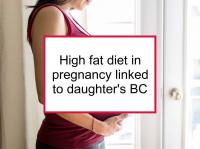Daughters of breast cancer survivors have a heightened risk of breast cancer even if the mothers are not BRCA mutation carriers. Women can take steps to reduce the breast cancer risk of their daughters, starting in the womb. These include dietary and lifestyle factors during pregnancy, as well as minimizing exposure to certain pollutants.
Now a new study has reported that prenatal exposure to estrogen or a diet high in omega-6 fats can increase breast cancer risk in multiple generations of rats.
Prenatal exposures associated with increased breast cancer risk
Exposure to the following factors has been found to be associated with increased risk of breast cancer in daughters in human or animal studies:
- Alcohol, all types
- Bisphenol A (BPA), styrene, and phthalates in plastics
- Cadmium
- Excessive folic acid supplementation
- Greenhouse and household pesticides
- Smoking the other hand, consumption of whole grains during pregnancy has been found to be associated with lower risk of subsequent breast cancer, possibly by enhancing DNA damage repair mechanisms. In addition, a relatively high omega-3 to omega-6 fatty acid ratio during pregnancy may reduce the risk of subsequent breast cancer in daughters.
Body weight during pregnancy and daughters' breast cancer risk
There is no clear answer as to whether overweight women are more likely to have daughters who eventually develop breast cancer. However, the effect of high body mass index (BMI), if any, appears to be small. Weight gain during pregnancy has also not been found to be associated with daughters' breast cancer risk. In other words, while high birth weight is associated with increased breast cancer risk, this appears to be due to factors independent of the mother's pre-pregnancy BMI or weight gain during pregnancy. In fact, severe calorie restriction during pregnancy has been shown to dramatically increase the risk of breast cancer of daughters in adulthood.
Latest research finds both estrogen and omega-6 diet increase risk
The study referenced at the beginning of this news article was designed to investigate whether feeding pregnant rats a high omega-6 fat or estrogen-supplemented diet would influence the risk of mammary cancer in their offspring and also in their granddaughters and great-granddaughters. To conduct the study, the authors used ethinyl-estradiol (EE2), which is related to 17β-estradiol (E2), an estrogen used in some birth control pills.
Mammary tumor development was found to be higher in the daughters and granddaughters of rats in the high omega-6 diet group, as well as in the daughters and great-granddaughters of the EE2-supplemented group. Additional experiments showed that the increase in mammary cancer risk conferred by the high omega-6 diet might be transmitted to granddaughters equally through the female or male ancestors. However, the increase conferred by EE2 was only transmitted to granddaughters through females.
The effects of prenatal EE2 exposure on mammary cancer risk was found to be associated with changes in the DNA methylation in the mammary tissue of all three EE2 generations. Such epigenetic changes are potentially reversible modifications in gene expression. Cumulative genetic and epigenetic alterations can transform normal breast cells into precancerous cells and finally into cancer cells.
The authors conclude that dietary and estrogenic exposures in pregnancy influence mammary cancer risk in multiple generations of offspring, possibly through epigenetic means.
Please see our article on the prenatal period and infancy in the prenatal period for more information.
